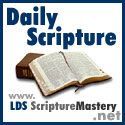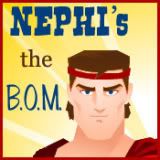Good Fathers
From Music and the Spoken Word
Delivered By: Lloyd D. Newell • Program 4318
The son of a renowned scientist recalls a powerful teaching moment that strengthened his relationship with his father. When the son entered college, the father encouraged him to follow in his footsteps and major in physics. One day the son was struggling with a complex mathematical problem and asked for his father’s help. They went to the blackboard they kept in the basement, and the father started writing.
Suddenly, the father stopped and asked: "Hal, we were working on this same kind of problem a week ago. You don’t seem to understand it any better now than you did then. Haven’t you been working on it?” When the son replied that he had not, the father questioned further: "When you walk down the street, when you’re in the shower, when you don’t have to be thinking about anything else, isn’t this what you think about?” Hal confessed that he did not.
It was a very tender and poignant moment, because Hal knew how much his father hoped he would become a scientist. The father paused for a moment and said: "Hal, I think you better get out of physics. You ought to find something you love so much that when you don’t have to think about anything, that’s what you think about.” Hal took his father’s advice and went on to a distinguished career as a professor. Even though the father would have liked his son to share his passion for science, most of all he wanted his son to do what was best for him.1
Some fathers want their children to be just like them. Most fathers hope their children become better than they are. And good fathers are able to put their aspirations aside and help their children define and achieve their own life’s dreams; they let go of their own desires and encourage their children to go after theirs.
Wise counsel, a worthy example, and empowering love are the building blocks of good fatherhood. Truly, a father’s work is never done because it lives on in the lives of his children.
1 See Gerald N. Lund, "Elder Henry B. Eyring: Molded by ‘Defining Influences,’” Ensign, Sept. 1995, 10, 12.











No comments:
Post a Comment